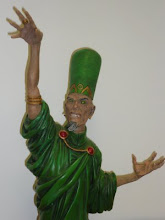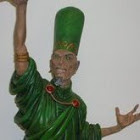 A wonderfully and deeply engaging anthology of stories about the impact of mental mental health issues on the people who directly suffer and those around them. Roddy McCance's deeply felt and sympathetic writing and Rolands Kalnins' stunning art make an outstanding difficult problem look easy. They present the problem and the person as related to each other, neither drown out the other and the balance brings the reader closely into the issue and the lives in a way that only fiction can. Mental health issues are frightening in a way few other problems are, they strike directly against the self that we all carry with us, they are a theft of our , literally, most personal possessions and fear of such loss makes cowards of nearly all of us. As this anthology makes clear with confident compassion is that those on the other side of the abyss are just as frightened and considerably more lonely.
A wonderfully and deeply engaging anthology of stories about the impact of mental mental health issues on the people who directly suffer and those around them. Roddy McCance's deeply felt and sympathetic writing and Rolands Kalnins' stunning art make an outstanding difficult problem look easy. They present the problem and the person as related to each other, neither drown out the other and the balance brings the reader closely into the issue and the lives in a way that only fiction can. Mental health issues are frightening in a way few other problems are, they strike directly against the self that we all carry with us, they are a theft of our , literally, most personal possessions and fear of such loss makes cowards of nearly all of us. As this anthology makes clear with confident compassion is that those on the other side of the abyss are just as frightened and considerably more lonely.The Persistence of Depression. Jay talks to someone about what it is like to be depressed, the internal, mental hellscape that he has to travel that he wants to exit from. Roddy McCance captures the enormous weight of depression, they all encompassing way that is keeps someone in its grip and every attempt to escape is another chance to be a failure. Rolands Kalnins's art captures the extraordinary range of the ways that someone can feel bad about themselves, they way that a hell constructed by yourself is always inventive. The colouring is magnificent, it captures the shifting shades of the emotional tones and pulls up the details of the art and the writing.
Clock of the World is a startling lucid and utterly compelling explanation of Bi-Polar Disorder that explains it as a matter of time, fast time, slow time and the need to control time. The inherent extremities if Bi-Polar Disorder make it hard to grasp the connections between the two. Roddy McCance solves that problem with creative insight and subtle confidence. Rolands Kalnins takes the central idea and makes it explicit, weighty and utterly compelling. The struggle to manage the physical mechanics of a giant time machine, a clock, that shifts modes from fast to slow and the impact of fast and slow time is captured with powerful, telling detail. The colouring is powerfully used to differentiate the time modes and underscore that it is always the same person.
Just Like Everyone. A apparently simple question, what do you see when you look in the mirror, is an agonizing, overwhelming matter for some. The ordinary desire to fit in is a huge dilemma as they try to match the perfection of others with the shapeless features they see in the mirror. Roddy McCance writes a very short and intimate story that captures the struggle, Rolands Kalnins' intimate , close up art captures the nuances of the story with precision.
War on Reality. Post Traumatic Stress Disorder is such a direct assault on the notions that mass organised violence is based on that truly acknowledging is effectively impossible, it is a very often burden to be borne, sometimes shamefully, by the individual. A father and son, both military veterans, find that they can share an understanding, lubricated by country music, and find room to support each other. Following the spine of a song and using two vivid flashbacks, the story is quietly set up and forceful in its impact. Rolands Kalnins' takes two men who are not hugely expressive and shows the deep bond between them , the beautiful colouring is used to provide the deep context for the things that are never said.
Our Song. The terrifying loss of self that dementia brings as one person slowly recedes from any shared life with others is traced with deep sympathy. Standing on the shore and watching his wife float further and further away into a new life as the life line of 'our song' slowly frays is heartbreaking. Art for a story where essentially nothing happens is hard to do, there is no action to carry the reader along, instead the quiet subtlety of changing details match and captures the depth of the story.
Mountaineering. Having a body that mocks your gender identity is a hugely public and private problem, being out of step on such a taken for granted issue is climbing a mountain every day. The struggle to be yourself and seen by others as yourself is brutal and fraught. Writing an extended metaphor is always a risk, it can simply not bear the weight or become so convoluted as to become meaningless. Roddy McCance, proving again that there are no rules for talent, makes it look easy and natural. Rolands Kalnins does the same for the art, carefully mixing up the metaphorical scenes with other ones that never break the story idea. Smashing colouring as usual.
Caitlyn. This is a very difficult story to read, the impact of bullying is not always fatal, it is always hugely destructive. The hammer blows of abuse that steadily shatter confidence and self belief are captured with horrifying clarity and the retreat from the onslaught is wretchedly credible. The utterly dominant colour scheme is vital to the story, the washed out colours of memory against the stark white boxes of the abuse display the power relationship all too clearly.
Chief Wizard Note: This is a review copy very kindly sent by Roddy McCance, Tales of the Fractured Mind started on Kickstarter and should be available on Comixology in a month, you should get it to see how passion, craft and talent combine to create a work of art.


No comments:
Post a Comment